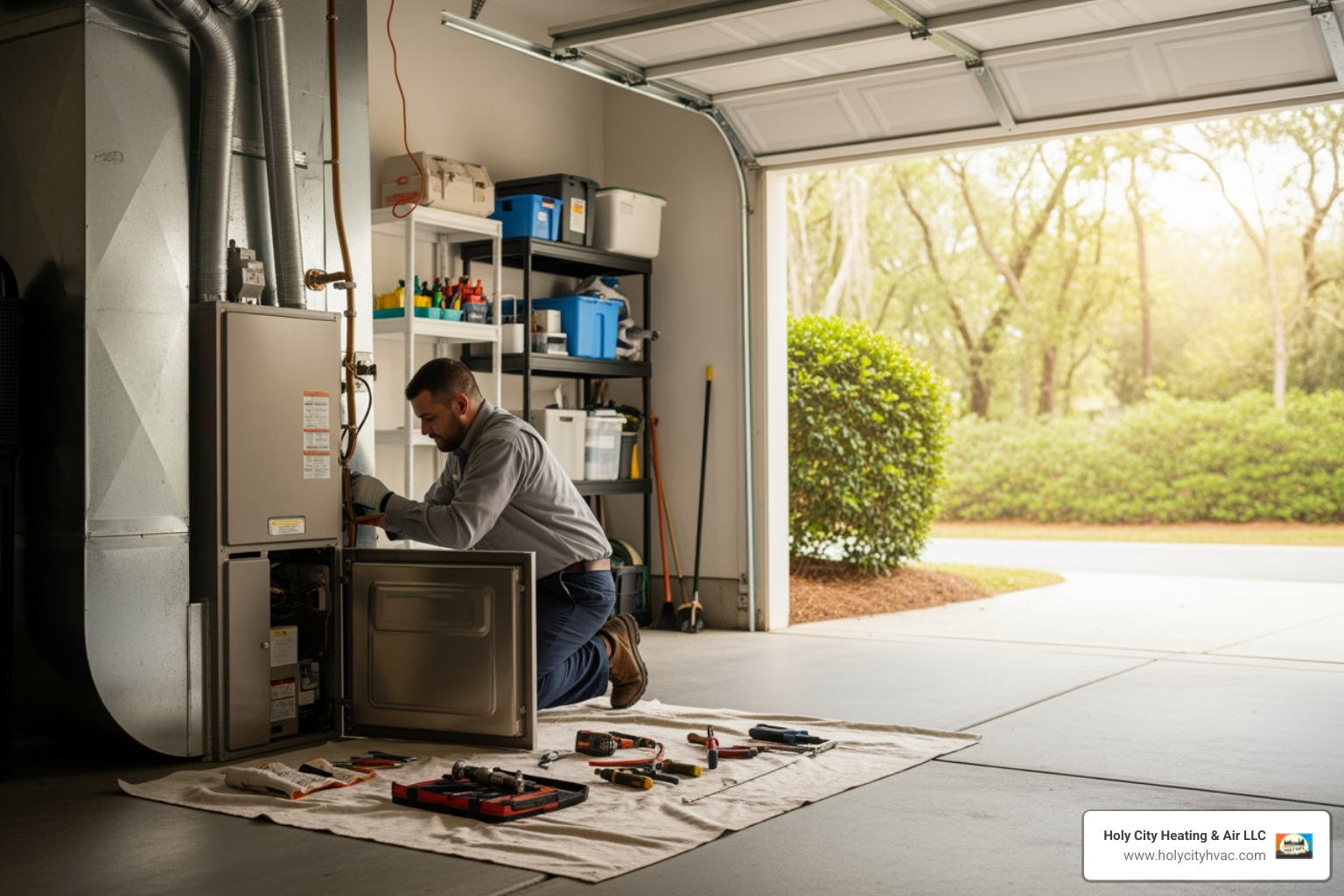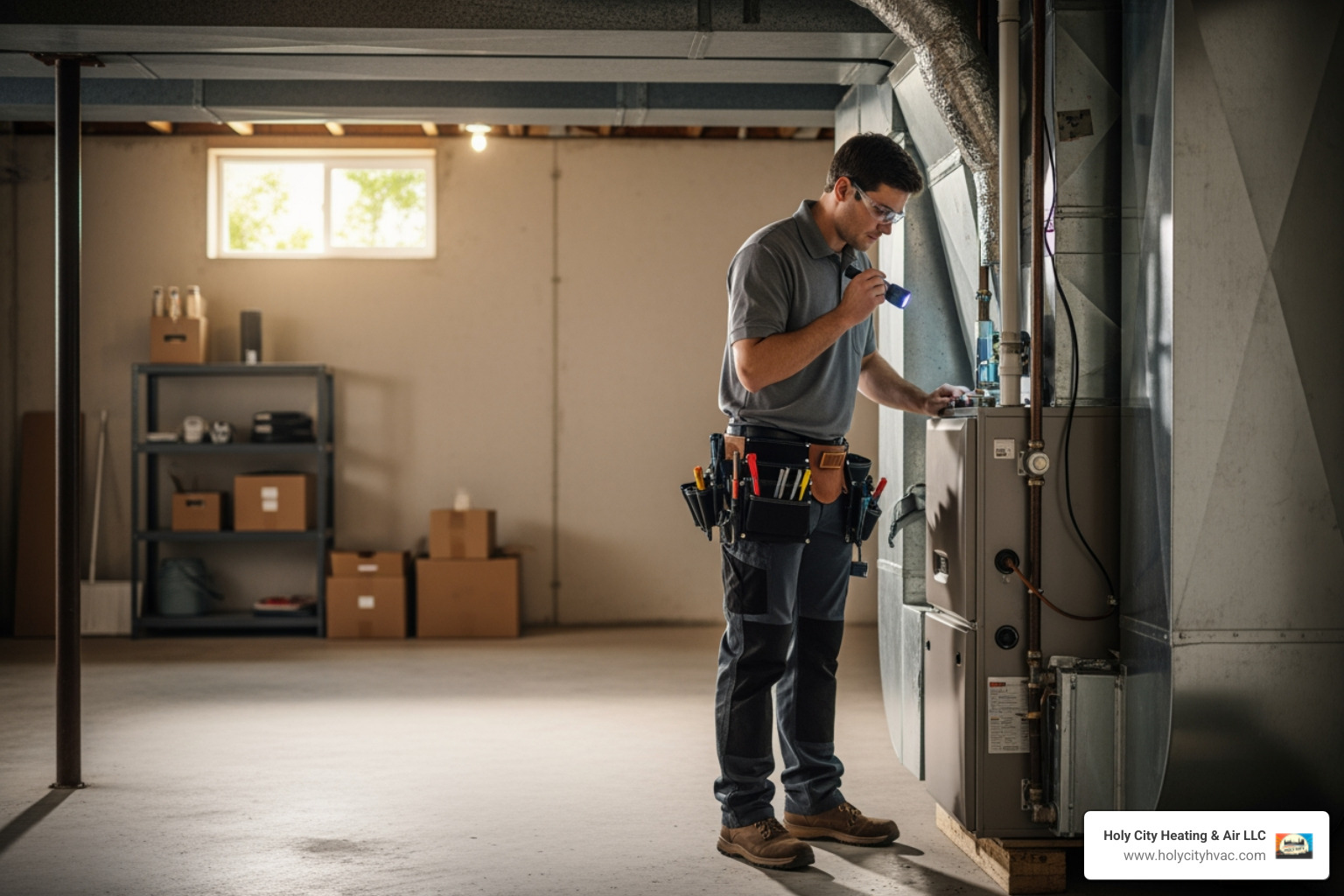
When Your Charleston AC Stops Working: Quick Diagnosis Guide
When your AC unit not working becomes a reality during Charleston's sweltering summer heat, every minute counts. The difference between a simple fix and an expensive repair often comes down to knowing what to check first.
Quick AC Troubleshooting Checklist:
- Check thermostat settings - Ensure it's set to "Cool" and below room temperature
- Inspect circuit breakers - Look for tripped breakers in your electrical panel
- Examine air filter - Replace if dirty or clogged (every 1-3 months)
- Clear outdoor unit - Remove debris from around condenser
- Listen for unusual noises - Humming, grinding, or hissing sounds indicate specific problems
There's an important distinction between an AC that won't turn on and one that runs but doesn't cool. A completely non-responsive unit often points to power or electrical issues, while a system blowing warm air typically indicates problems with refrigerant, coils, or airflow.
As one frustrated homeowner put it: "Nothing can cause more dread with an air conditioner than turning it on during a heatwave, only for it to blow hot air in your face." The good news? Many AC problems have simple solutions you can tackle yourself before calling for professional help.
Understanding these basics can save you time, money, and discomfort while keeping you cool in Charleston's humid climate.

First Steps: Simple DIY Checks Before You Call for Help
When your AC unit not working throws a wrench in your summer plans, don't panic just yet! We get it – Charleston's heat doesn't wait for anyone, and that broken AC feels like an emergency. But before you reach for your phone, take a deep breath and try these simple troubleshooting steps. You might be surprised how often these basic checks can get your system humming again.
Think of this as your AC's version of "Have you tried turning it off and on again?" These aren't complicated fixes – they're the kind of simple solutions that can save you time, money, and a lot of frustration on a sweltering afternoon.
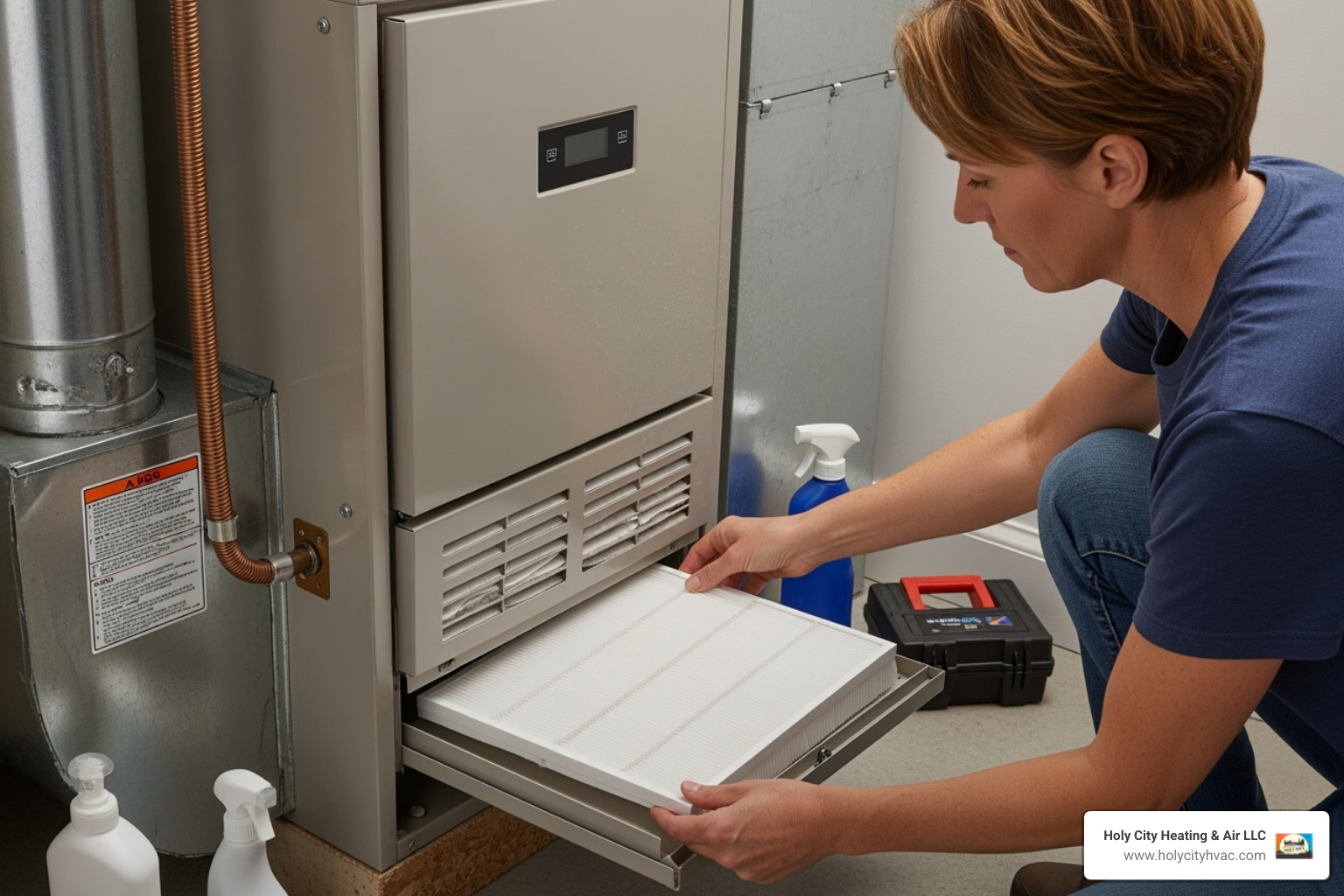
Check Your Thermostat and Power Supply
Your thermostat might look innocent sitting there on the wall, but it's actually the boss of your entire AC system. And sometimes, the boss needs a little attention.
Start with the obvious stuff that makes us all feel a bit silly when we find it. Check that your thermostat is set to "Cool" and that the temperature setting is at least 3-5 degrees below what your home feels like right now. We've all been there – coming back from a weekend trip and wondering why the house feels like a sauna, only to realize the thermostat got bumped to "Heat" somehow.
If your thermostat display looks dim or completely blank, those batteries might be dead. It's one of those things that always seems to happen at the worst possible moment, but fresh batteries can work miracles.
Now let's talk about power – because your AC can't run on good intentions alone. Head over to your electrical panel (usually hiding in the garage, basement, or utility closet) and look for any tripped circuit breakers. You're looking for switches that might be sitting halfway between "On" and "Off" – that's your culprit right there.
Here's the right way to reset a tripped breaker: flip it all the way to "Off" first, then push it firmly back to "On." If it trips again immediately, stop there. That's telling you there's a bigger electrical problem that needs professional attention, and repeatedly flipping it could be dangerous.
Don't forget about those AC shutoff switches near your outdoor unit or indoor air handler. Sometimes these get accidentally turned off during yard work or home projects. A quick check can save you an embarrassing service call!
Want to reset your AC unit? Most systems don't have a magic reset button, but here's what works: turn off the AC at your thermostat, reset any tripped breakers, then wait about 30 minutes before turning everything back on. This gives your compressor time to cool down and reset itself – think of it as a power nap for your AC.
If you're interested in upgrading your thermostat for better efficiency and control, you can find more info on energy-efficient thermostats to help optimize your home's comfort.
Inspect Your Air Filter and Outdoor Unit
Here's something that might surprise you: a dirty air filter is behind more AC problems than almost anything else. It's like trying to breathe through a thick blanket – your poor AC is gasping for air!
When your filter gets clogged with dust, pet hair, and all the stuff floating around your home, it creates a domino effect of problems. Reduced airflow makes your system work harder, drives up your energy bills, and can even cause those expensive evaporator coils to freeze up.
The good news? Changing your filter is probably the easiest maintenance task you'll ever do. In Charleston's humid climate, especially if you have pets or run your AC frequently, aim to swap it out every 1-3 months. Mark it on your calendar – your AC will thank you for it.
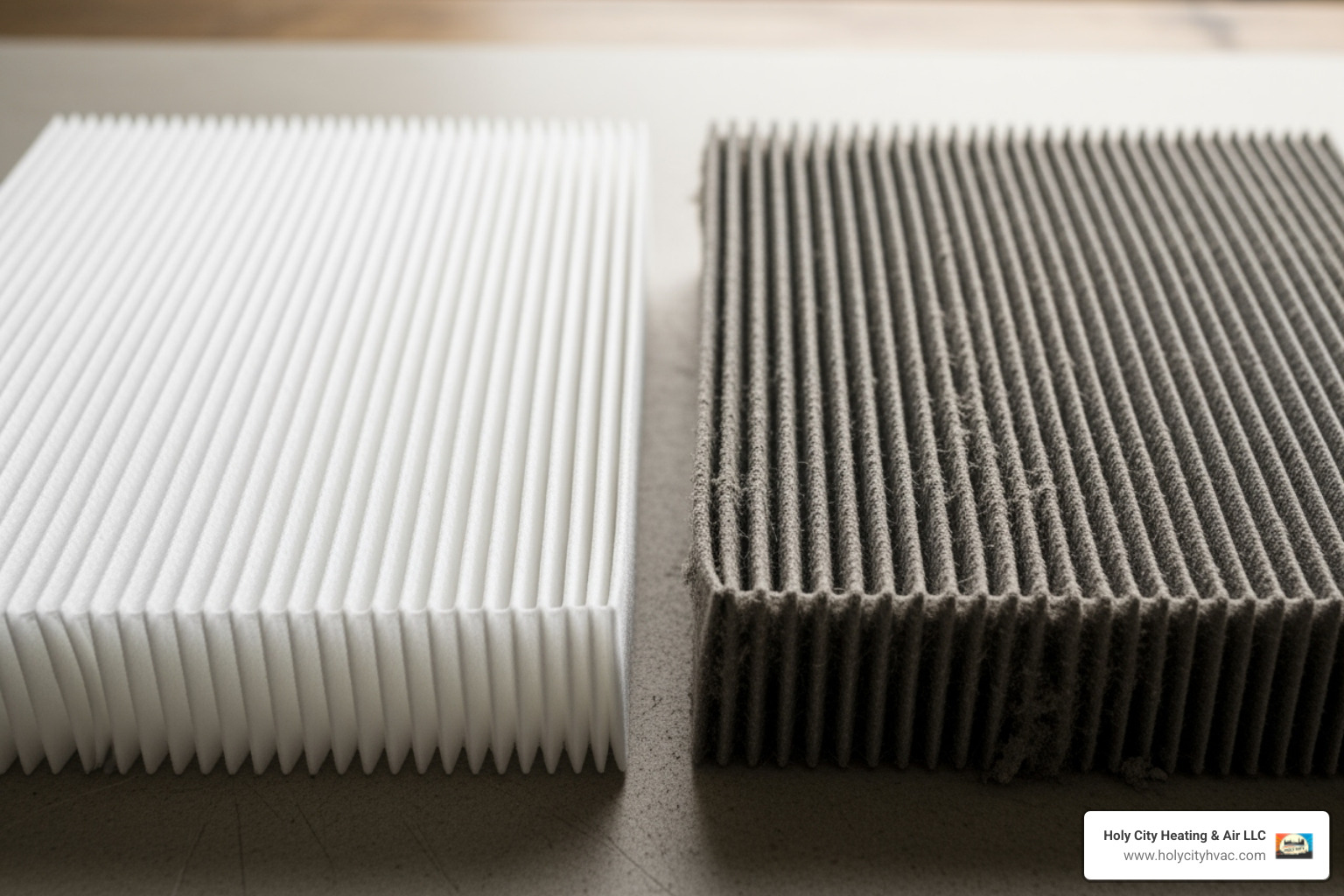
Now let's step outside and check on your outdoor condenser unit – that's the big box that sits outside and does the heavy lifting of releasing heat from your home. If it's buried under leaves, grass clippings, or other debris, it can't do its job properly.
Walk around your unit and clear away any debris you see. Your condenser needs breathing room – at least two feet of proper clearance on all sides. Think of it like personal space for your AC.
Those condenser coils (the metal fins you can see) can get pretty grimy over time. You can give them a gentle rinse with your garden hose, spraying from the inside out to push dirt away from the coils. Just be gentle – no pressure washing – and keep water away from any electrical components.
A clean outdoor unit with good airflow around it can make the difference between an AC that struggles through the summer and one that keeps you comfortable all season long.
Why Is My AC Unit Not Working? Common Culprits & Symptoms
Once you've tackled those initial DIY checks and your AC unit not working problem persists, it's time to play detective. The good news? Your AC system is actually pretty good at telling you what's wrong – you just need to know how to listen and what to look for.
Think of it this way: your AC has its own language of sounds, smells, and behaviors. A humming outdoor unit might be crying for a new capacitor, while that dreaded warm air could mean your evaporator coils have turned into an ice sculpture. Each symptom tells a story, and understanding these stories can help you determine whether it's a quick fix or time to call in the professionals.
What Those Strange AC Noises Are Trying to Tell You:
- Squealing usually means a worn fan belt or failing motor bearing
- Grinding points to motor bearings that need attention
- Buzzing often signals electrical issues like a failing capacitor or loose connections
- Hissing typically indicates a refrigerant leak, especially with poor cooling
- Rattling or banging suggests loose parts or, in serious cases, compressor problems
- Persistent clicking could mean thermostat or relay issues
Troubleshooting an AC unit not working due to power or component failure
Sometimes your AC gets power to the house just fine, but specific components inside the system decide to call it quits. These electrical hiccups are more common than you'd think, especially in our humid Charleston climate where components work overtime.
The capacitor is often the culprit. This small, cylindrical component acts like a battery, storing energy to kick-start your fan motor and compressor. When it fails, you'll typically hear your outdoor unit humming like it's trying really hard to start, but the fan just won't spin. It's like a car engine turning over but never catching.
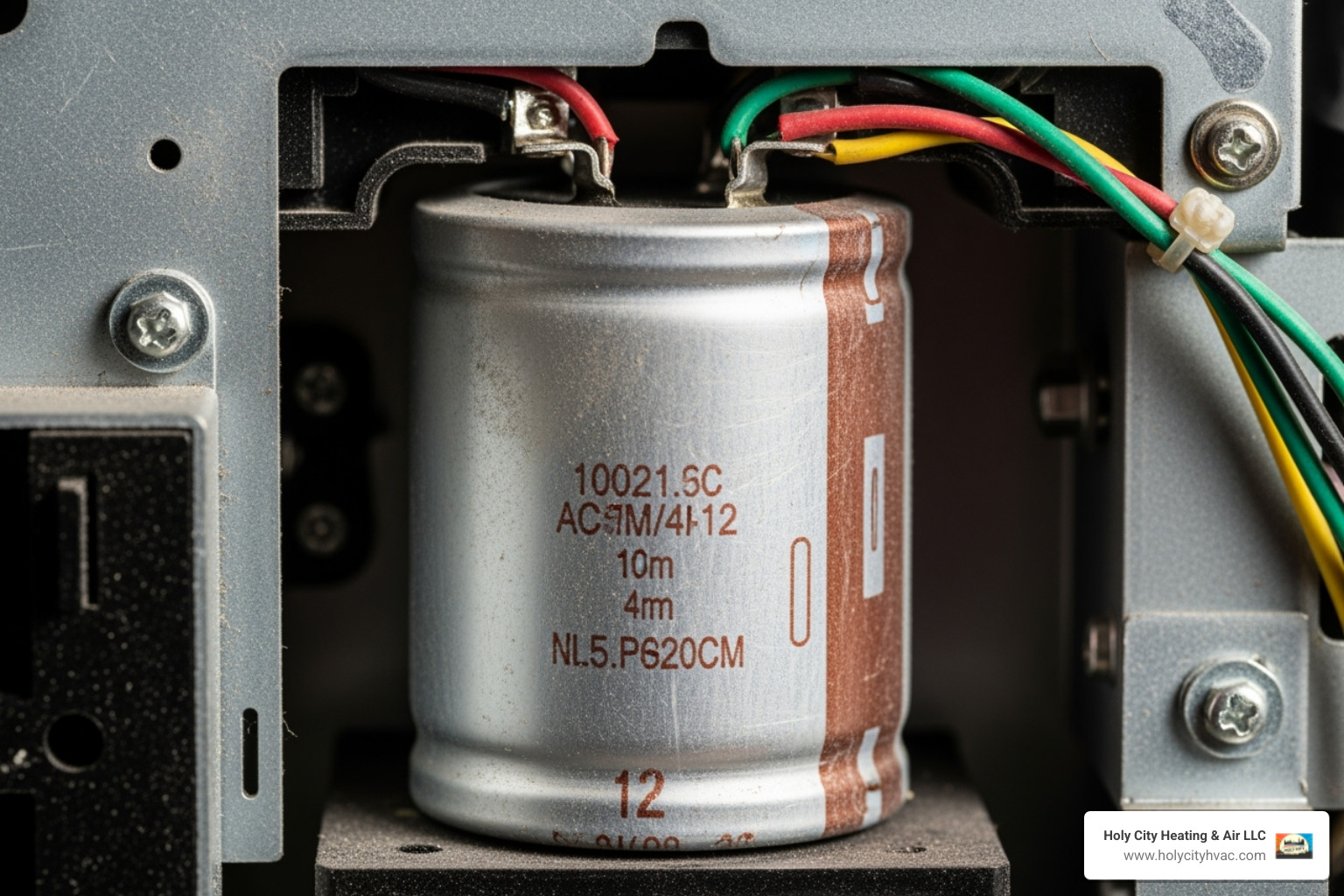
You might even see physical signs of capacitor failure – swelling, leaking, or a bulging top. Capacitors typically last 10 to 15 years, so if your system is getting up there in age, this is a prime suspect. The humming sound without startup usually points to a failing start capacitor, while short-cycling or delayed operation often indicates a run capacitor on its way out.
Fan motor problems can also leave you hot and bothered. Whether it's the outdoor condenser fan or the indoor blower motor, when these components fail, your cooling suffers dramatically. The condenser fan needs to spin to release heat from your system – without it, your AC can't complete its cooling cycle effectively.
Contactor issues are another common electrical problem. Think of the contactor as a relay switch that tells your compressor and condenser fan when to turn on. When it wears out or gets damaged from electrical arcing, your outdoor unit won't get the memo to start cooling. You might notice pitting, melting, or burning around the contacts.
Diagnosing an AC unit not working because it's blowing warm air
There's nothing quite as frustrating as feeling your AC running but getting a blast of warm air instead of that sweet, cool relief. This scenario usually means something's gone wrong in the actual cooling process, and the fix often requires professional attention.
Frozen evaporator coils are surprisingly common, especially when homeowners skip filter changes. When airflow gets restricted – usually by a dirty filter – your indoor coils get too cold and literally freeze up. It's ironic, really: ice forming because your AC is working too hard to cool your home.
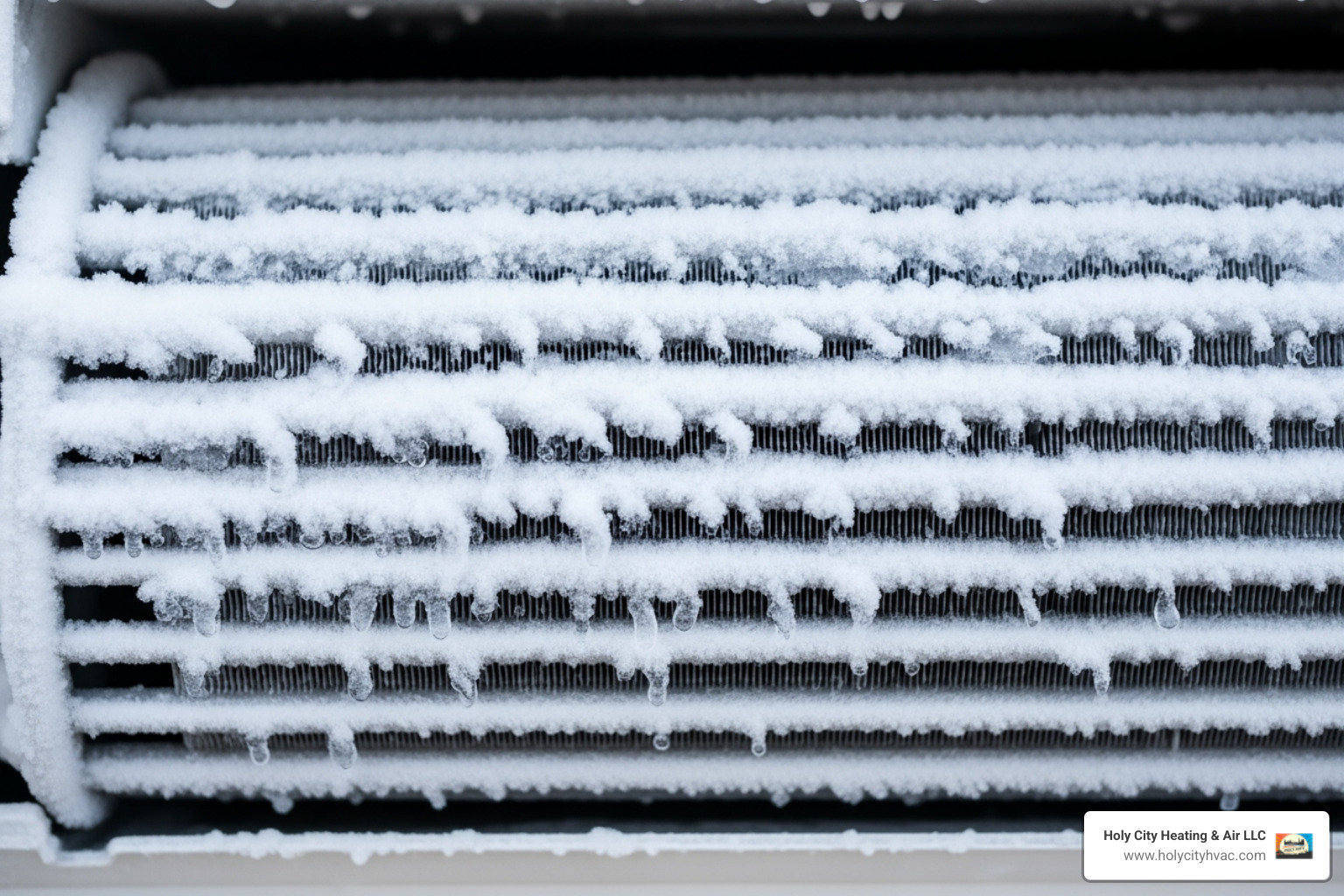
Low refrigerant can also cause coils to freeze. When there isn't enough refrigerant circulating, what's left gets extremely cold, leading to ice formation. If you find frozen coils, turn off your AC immediately (you can leave the fan running to help thaw them) and wait. This thawing process can take anywhere from a few hours to half a day, but running your system with frozen coils can seriously damage your compressor.
Find additional information on frozen evaporator coils here.
Low refrigerant levels are almost always the result of a leak somewhere in your system. Refrigerant doesn't get "used up" like gas in your car – it circulates in a closed loop. If levels are low, there's a leak that needs professional repair. You might hear hissing sounds or notice oily residue around your coils if refrigerant is escaping.
Dirty condenser coils act like a thick blanket wrapped around your outdoor unit, preventing proper heat release. Even if you've cleared debris from around the unit, the coils themselves can accumulate a coating of dirt and grime over time. Your system will run and run, working harder than ever, but that heat just can't escape effectively.
Leaky ductwork is particularly common in older Charleston homes. Your AC might be producing perfectly cool air, but if it's escaping through cracks and gaps in your ducts before reaching your living spaces, you'll never feel the benefit. It's like trying to fill a bucket with holes in the bottom.
What to do if your AC is leaking water or has a clogged drain line
Water where it shouldn't be is always cause for immediate concern. Your AC naturally produces condensation – that's part of how it removes humidity from your home's air. But when that water doesn't drain properly, you're looking at potential property damage and definitely an AC unit not working situation.
Clogged condensate drain lines are incredibly common in our humid Lowcountry climate. As your AC removes moisture from the air, that water collects in a drain pan and should flow out through a small pipe (usually PVC) that exits near your outdoor unit. Over time, algae, dirt, and debris can clog this line, causing water to back up.
Many newer systems have a built-in safety feature called a float switch or wet switch. When water levels in the drain pan get too high, this switch automatically shuts off your AC to prevent flooding. So if your system suddenly stops working and you notice water pooling around your indoor unit, a clogged drain is likely the culprit.
Musty odors coming from your vents often signal moisture problems and potential mold growth in your drain pan, condensate line, or even ductwork. In Charleston's humidity, this can develop quickly if drainage isn't working properly.
For simple clogs, you can try using a wet/dry vacuum on the outdoor end of the drain line to suck out the blockage. Pouring a cup of distilled vinegar down the drain line access port (near your indoor unit) can help dissolve minor clogs and prevent future ones. Just make sure to turn off your system first for safety.
The golden rule with water leaks: turn off your AC immediately. Continuing to run a system with drainage problems can lead to extensive water damage throughout your home. Turn it off immediately to avoid costly water damage.
When to Call a Professional: Repair vs. Replacement
While we love empowering our Charleston neighbors to handle basic troubleshooting, there comes a point when your AC unit not working requires the expertise of trained professionals. Some AC problems involve serious safety risks, especially when dealing with electrical components or refrigerants that can be dangerous without proper training and equipment.
Think of it this way: you might change your car's oil, but you probably wouldn't rebuild the engine. The same principle applies to your AC system. Our EPA-certified and licensed professionals have spent years learning the intricacies of HVAC systems, and we carry specialized tools that most homeowners don't have access to.
Serious Issues That Require an Expert
When your AC unit not working involves certain problems, it's time to step back and let the professionals take over. Refrigerant leaks top this list. As we mentioned earlier, if your system is low on refrigerant, there's always a leak somewhere. Handling refrigerant isn't just tricky – it requires EPA certification due to environmental regulations and potential health risks. You might hear hissing sounds, notice reduced cooling, or see ice forming on the coils. These are all red flags that require professional attention.
Compressor failure is another big one. Think of the compressor as your AC's heart – when it stops working, your whole system fails. You'll know something's seriously wrong if you hear loud banging noises during startup, your unit constantly trips the circuit breaker, or the outdoor unit makes a humming sound but won't actually run. Compressor replacement is a major repair that requires specialized knowledge and tools.
Frequent circuit breaker trips should never be ignored. An occasional tripped breaker might just be a fluke, but if your AC keeps tripping the breaker after you reset it, you're looking at a significant electrical problem. This could be a short circuit, an overloaded circuit, or a failing motor drawing too much power. This isn't just about comfort – it's a serious safety concern that needs immediate professional attention.
Any burning smells coming from your AC unit should prompt you to turn it off immediately and call us. This could indicate burning wires, an overheating motor, or other electrical problems that pose fire risks.
Our technicians use specialized equipment like electronic leak detectors and UV dyes to locate and repair refrigerant leaks properly. We ensure the system is completely sealed before recharging it, something that requires both the right tools and years of experience.
Is It Time to Repair or Replace Your AC Unit?
This is probably the most common question we hear when homeowners face recurring problems with their AC unit not working. The answer isn't always straightforward, but we can share some guidelines that help our customers make informed decisions.
The average AC system lasts 15-20 years, though our humid Charleston climate, usage patterns, and maintenance history all play a role. We often use what's called the "5,000 Rule" as a starting point: if the estimated repair cost multiplied by your unit's age equals more than $5,000, replacement usually makes more financial sense.
But numbers don't tell the whole story. If your unit is under 8 years old and needs a significant repair, it's almost always worth fixing, especially if it's still under warranty. On the flip side, if your system is over 15 years old and you're facing a major repair, replacement often provides better long-term value.
Frequent breakdowns are another key indicator. If you're calling for repairs more than twice a year, or if you've had multiple different components fail recently, your system might be telling you it's time to retire. Similarly, if your energy bills keep climbing despite normal usage, an aging, inefficient system could be costing you more than a new, energy-efficient model would.
There's also the R-22 refrigerant factor to consider. If your older system uses R-22 (also called Freon), you should know this refrigerant is being phased out and has become extremely expensive. A refrigerant leak in an R-22 system often tips the scale toward replacement rather than repair.
Signs pointing toward repair include a relatively new system (under 10 years), isolated component failures, good maintenance history, and reasonable repair costs. Signs pointing toward replacement include advanced age (over 15 years), multiple recent failures, rising energy costs, R-22 refrigerant, and when the repair cost approaches half the price of a new system.
The benefits of a new, energy-efficient system go beyond just reliability. Modern AC units are significantly more efficient than systems from even 10 years ago, which means lower monthly energy bills. They also come with comprehensive warranties and often qualify for utility rebates or tax credits.
At Holy City Heating & Air, we've been helping Charleston families make these decisions since 2015, backed by over 20 years of industry expertise. We'll always give you our honest assessment – sometimes that means a simple repair, and sometimes it means helping you choose a new system that'll keep your family comfortable for decades to come.
Frequently Asked Questions about a Broken AC
When your AC unit not working becomes a reality, certain questions come up again and again. We've heard them all over our years serving Charleston families, and we're here to give you straight answers that actually help.
How can I tell if my AC capacitor is bad?
The capacitor is like the starter motor in your car – without it, nothing gets going. When it starts to fail, your AC will give you some pretty clear warning signs.
The most telltale sign is a humming sound from your outdoor unit when it tries to start up. It's like the unit is saying "I want to work, but I just can't get going!" You might also notice that the fan won't spin on its own, but if you give it a gentle push with a stick (never your hand!), it starts running. That's your capacitor crying for help.
Sometimes you can actually see the problem. A visibly bulged, swollen, or leaking capacitor is definitely done for. If you spot oil or other fluid around the capacitor, or if the top looks like a soda can that's been shaken up, it needs immediate replacement.
Why is my outside AC unit not running but the inside is?
This scenario stumps a lot of homeowners, but it's actually pretty common. Your indoor and outdoor units work as a team, but they have separate electrical supplies and components that can fail independently.
The most likely culprit is a tripped breaker specifically for your condenser unit. Check your electrical panel for a second AC breaker – many homes have separate breakers for the indoor and outdoor components. Just like we discussed earlier, flip it completely off and back on.
A bad capacitor or contactor in the outdoor unit can also cause this issue. The contactor is like an electrical relay that tells your outdoor unit to kick on when the indoor unit calls for cooling. When it fails, the outdoor unit never gets the message to start working.
Sometimes a safety switch has shut the unit down to protect it from damage. This could be due to low refrigerant, overheating, or other issues that require professional attention. Your AC is actually trying to save itself from more expensive damage.
How often should I have my AC unit serviced?
Here in Charleston's humid, demanding climate, your AC works harder than systems in drier areas. All that moisture and heat put extra stress on every component, from the compressor to the smallest electrical connection.
We recommend professional servicing once a year, ideally in the spring before the summer heat really kicks in. Think of it like getting your car inspected – you want to catch small problems before they become big, expensive ones during the hottest week of July.
During a professional service, our EPA-certified technicians clean coils, check refrigerant levels, test electrical components, replace filters, clear drain lines, and catch issues you'd never notice until they cause your AC unit not working completely. It's especially important for units over five years old, when wear-and-tear issues start appearing.
Regular maintenance doesn't just prevent breakdowns – it keeps your energy bills lower and extends your system's lifespan. In our experience, well-maintained AC units can easily last 15-20 years, while neglected ones often fail after just 8-10 years.
Stay Cool, Charleston: Your Next Steps for AC Repair
We hope this guide has given you the confidence to tackle some basic troubleshooting when your AC unit not working disrupts your comfort. Simple steps like checking your thermostat settings, replacing a dirty air filter, clearing debris from your outdoor unit, and inspecting your condensate drain line can often solve minor issues and get you back to enjoying cool air.
But here's the thing – even with all the DIY knowledge in the world, regular preventative maintenance is your best friend. Think of it like getting your car serviced regularly. A yearly tune-up by our EPA-certified professionals can catch those sneaky little problems before they turn into expensive nightmares, especially in Charleston's demanding climate where your AC works overtime.
Don't ignore the warning signs. If you've worked through our troubleshooting checklist and your AC unit not working persists, it's time to call in the cavalry. Strange noises that won't quit, water pooling where it shouldn't, or an AC that's blowing anything but cold air are all red flags that need professional attention.
Attempting complex repairs involving electrical components or refrigerant without proper training isn't just risky – it's dangerous and can turn a manageable repair into a major replacement.
At Holy City Heating & Air LLC, we've been keeping Charleston families comfortable since 2015, with over 20 years of industry expertise backing every service call. We're a family-owned company that combines the reliability of comprehensive Daikin warranties with the personal touch you'd expect from your neighbors. Our EPA-certified, licensed professionals understand the unique challenges of our humid Lowcountry climate and how it affects your home's comfort.
We believe in integrity, customer satisfaction, and long-lasting comfort for every home we serve. When Charleston's heat has you feeling defeated, we're here with honest, reliable service that gets results fast.
Ready to get your comfort back on track? Schedule your professional air conditioning service today!
Recent posts






